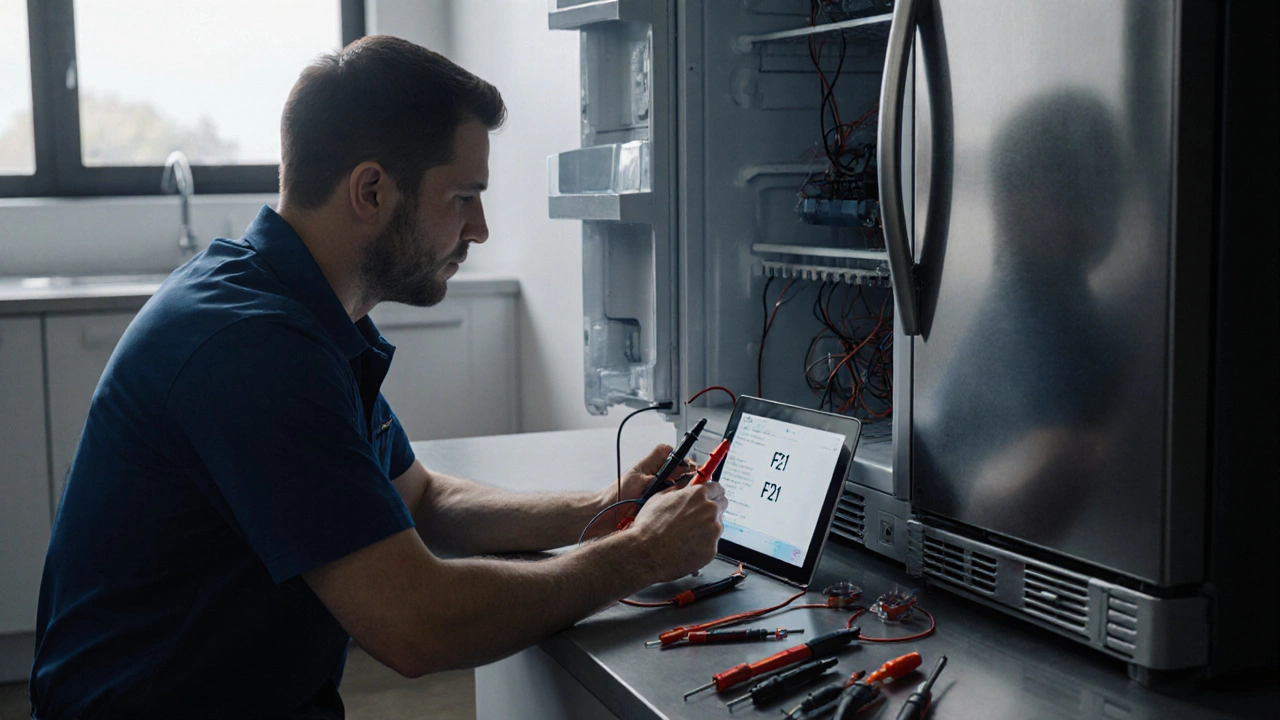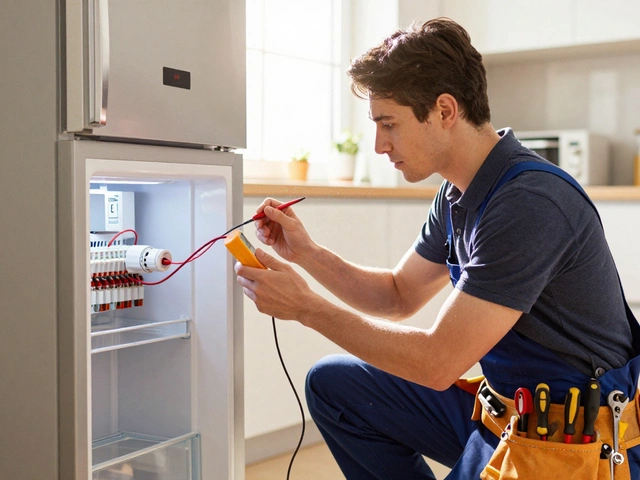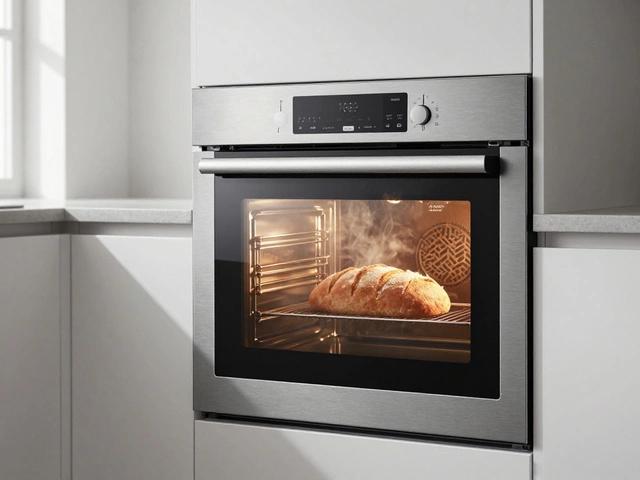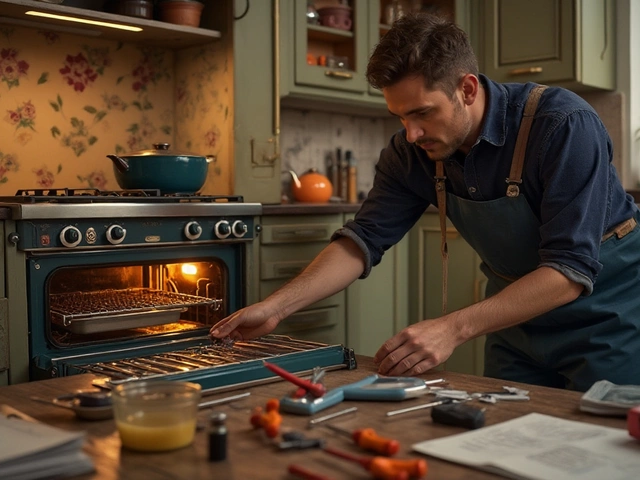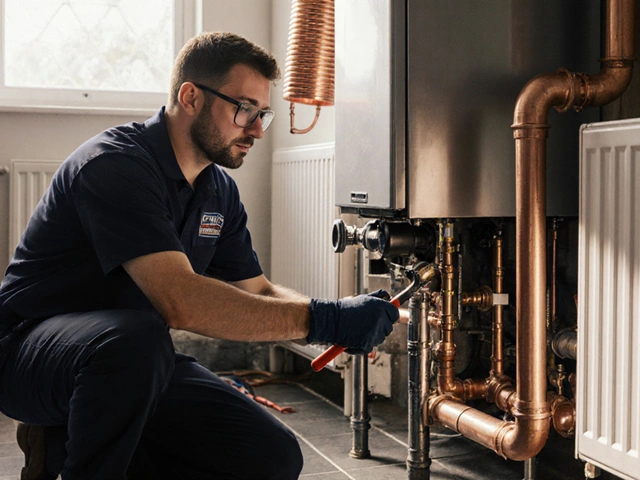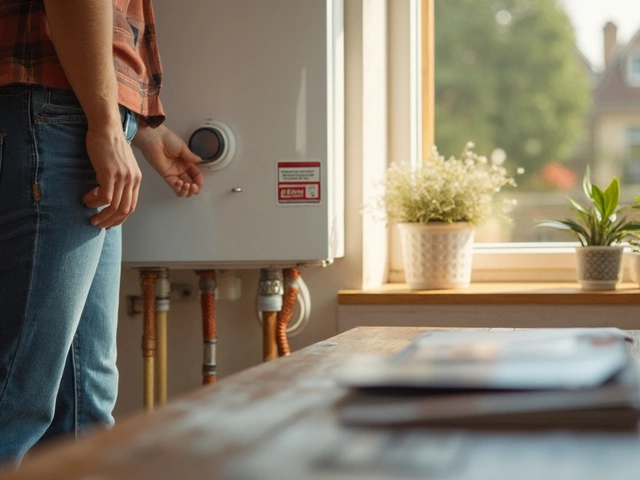Appliance Repair Cost Calculator
Calculate whether repairing your appliance is more cost-effective than replacing it based on age, repair costs, and energy savings.
Repair vs Replacement Analysis
Energy Savings: Repairing saves approximately $0 per year in energy costs.
Based on article research: Appliances older than 10 years often cost more to maintain than replace. A specialist can help you make the most cost-effective decision.
Ever wonder who shows up when your fridge stops cooling or your oven won’t turn on? It’s not magic-it’s an appliance specialist. These aren’t just handy people with screwdrivers. They’re trained professionals who diagnose, repair, and maintain the machines you rely on every day. In homes across Auckland and beyond, appliance specialists keep everything from dishwashers to heat pumps running smoothly. But what exactly do they do? And why is their work more complex than it looks?
They Don’t Just Fix Things-They Diagnose Them
An appliance specialist doesn’t start by swapping parts. They start by asking questions. Was the machine making a noise before it failed? Did it shut off suddenly? Has it been leaking? These aren’t small talk questions-they’re diagnostic clues. Modern appliances are packed with electronics, sensors, and microcontrollers. A washing machine that won’t spin could be a broken motor, a faulty control board, a clogged drain pump, or even a software glitch. An untrained person might replace the motor and still have the same problem. A specialist uses multimeters, diagnostic software, and years of experience to isolate the real issue.
Take a fridge that’s not cooling but still hums. The compressor might seem fine, but if the evaporator fan is stuck or the defrost timer is faulty, cold air won’t circulate. Specialists know these hidden failure points. They’ve seen it all: refrigerant leaks in older units, thermistor failures in newer smart fridges, even wiring damage from rodents chewing through insulation. They don’t guess-they test.
They Work With Complex Systems, Not Just Parts
Older appliances were mostly mechanical. Turn a knob, heat a coil, spin a drum. Today’s appliances are mini-computers with motors. A modern oven doesn’t just turn on a heating element-it adjusts temperature based on humidity sensors, monitors fan speed, and communicates with a smartphone app. An appliance specialist needs to understand both the hardware and the software side.
They’ve learned how to reset firmware glitches on Samsung washers, update firmware on Bosch dishwashers, and interpret error codes like F21 or E05 that mean nothing to the average homeowner. These codes aren’t random-they’re standardized across brands and point to specific faults. A specialist knows that F21 on a Whirlpool washer means a drain pump timeout, not a broken belt. That’s the difference between replacing parts blindly and fixing the root cause.
They Know the Difference Between Repair and Replace
Not every broken appliance needs a full replacement. But not every repair is worth it either. An appliance specialist helps you decide. They’ll look at the age of the unit, the cost of the part, labor time, and how much longer the appliance is likely to last after the fix.
For example, a 12-year-old fridge with a failing compressor might cost $800 to repair. A new energy-efficient model costs $1,200. The specialist will tell you: “This unit uses 40% more power than newer models. Even if you fix it, you’ll pay more in electricity over the next two years.” That kind of advice saves money in the long run. They’re not trying to upsell-they’re trying to give you the best value.
On the flip side, a five-year-old dishwasher with a broken door latch might only need a $40 part and 30 minutes of work. The specialist will fix it, not replace it. Their job isn’t to sell you a new appliance-it’s to make the right call for your situation.
They Handle Safety and Compliance
Appliances aren’t just inconvenient when they break-they can be dangerous. Gas ovens can leak. Electric dryers can overheat and catch fire. Water heaters can burst if pressure builds up. An appliance specialist is trained in safety standards like AS/NZS 60335 (the New Zealand and Australian standard for household appliances). They know how to check gas connections for leaks using soapy water or electronic detectors. They understand grounding requirements, circuit breaker ratings, and proper ventilation for dryers and range hoods.
They also know what’s legal. In New Zealand, only licensed technicians can work on gas appliances. An unlicensed person replacing a gas valve could void your insurance or even break the law. A specialist carries the right certifications and follows strict protocols. That’s not just professionalism-it’s protection for you and your home.
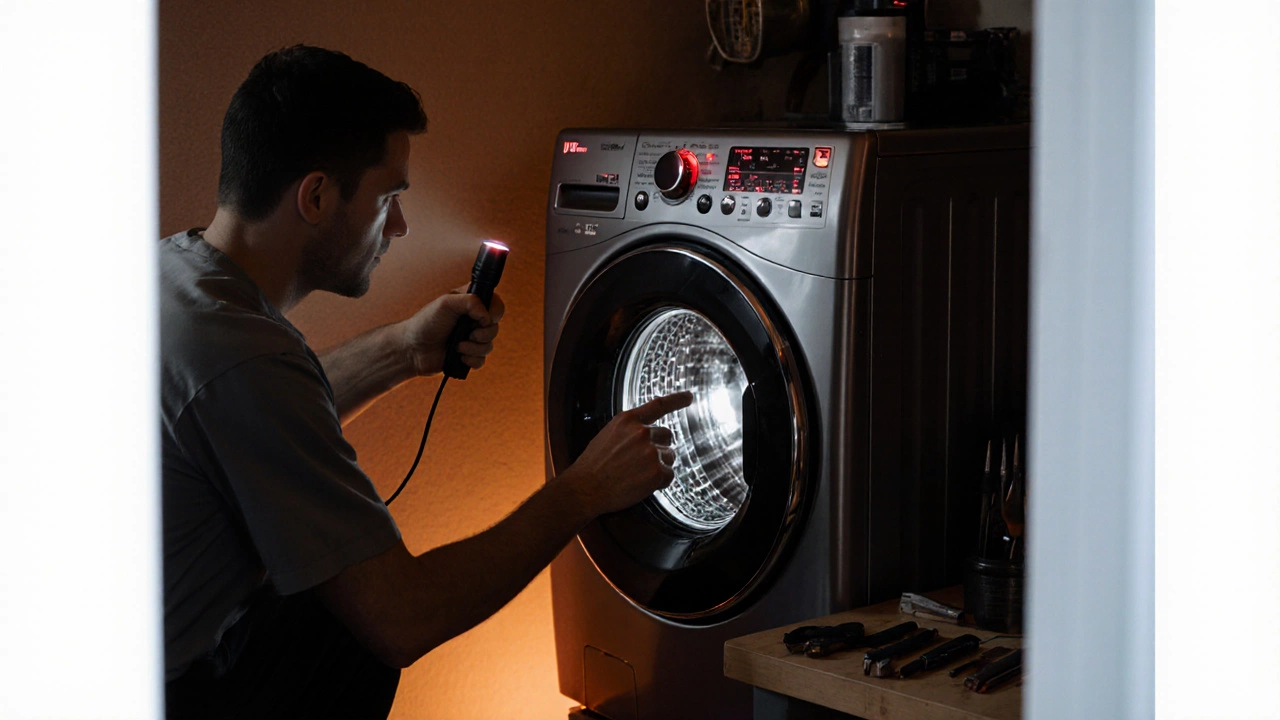
They Keep Appliances Running Longer
Most people think of appliance specialists as emergency responders. But their biggest impact comes from prevention. Regular maintenance-cleaning lint traps, checking door seals, descaling kettles, inspecting hoses-can add years to an appliance’s life. A specialist will often recommend simple habits: wipe down the rubber gasket on your fridge to prevent mold, flush your water heater annually to remove sediment, or run a vinegar cycle in your dishwasher to clear mineral buildup.
They’ve seen homes where fridges lasted 20 years because the owner had them checked every two years. And they’ve seen others where a $150 repair turned into a $1,200 replacement because no one cleaned the condenser coils. Good maintenance isn’t expensive-it’s cheap insurance.
They Know the Brands Inside Out
Not all appliances are created equal. A Samsung refrigerator has different wiring layouts than a Liebherr. A Miele dishwasher has proprietary error codes. A Fisher & Paykel washer uses a unique motor controller. An appliance specialist doesn’t just know how to fix “a washing machine.” They know how to fix that specific model.
They keep up with manufacturer bulletins, recall notices, and common failure trends. For example, some LG dryers from 2018-2021 had a known issue with the heating element failing due to poor airflow. Specialists who’ve seen this pattern know to check the venting system first-saving hours of unnecessary part replacements.
They also know which brands are reliable for repairs. Some models are designed to be disposable-parts are expensive or hard to get. Others are built like tanks and can be fixed for decades. That knowledge helps them advise you better.
They’re More Than Technicians-They’re Problem Solvers
Imagine your dishwasher stops mid-cycle. You call for help. The specialist arrives, checks the control panel, finds a tripped thermal fuse, replaces it, and tests the machine. But then they notice something else: the detergent dispenser is caked with residue, and the spray arms are clogged. They clean it out. They show you how to prevent it next time. That’s not just a repair-it’s a lesson.
They explain why your clothes are still wet after a cycle. They point out that your dryer’s exhaust duct is too long and has too many bends. They tell you why your oven’s temperature is off by 30 degrees. They don’t just fix the machine-they help you understand it.
That’s the real value of an appliance specialist. They turn confusion into clarity. They turn panic into peace of mind.
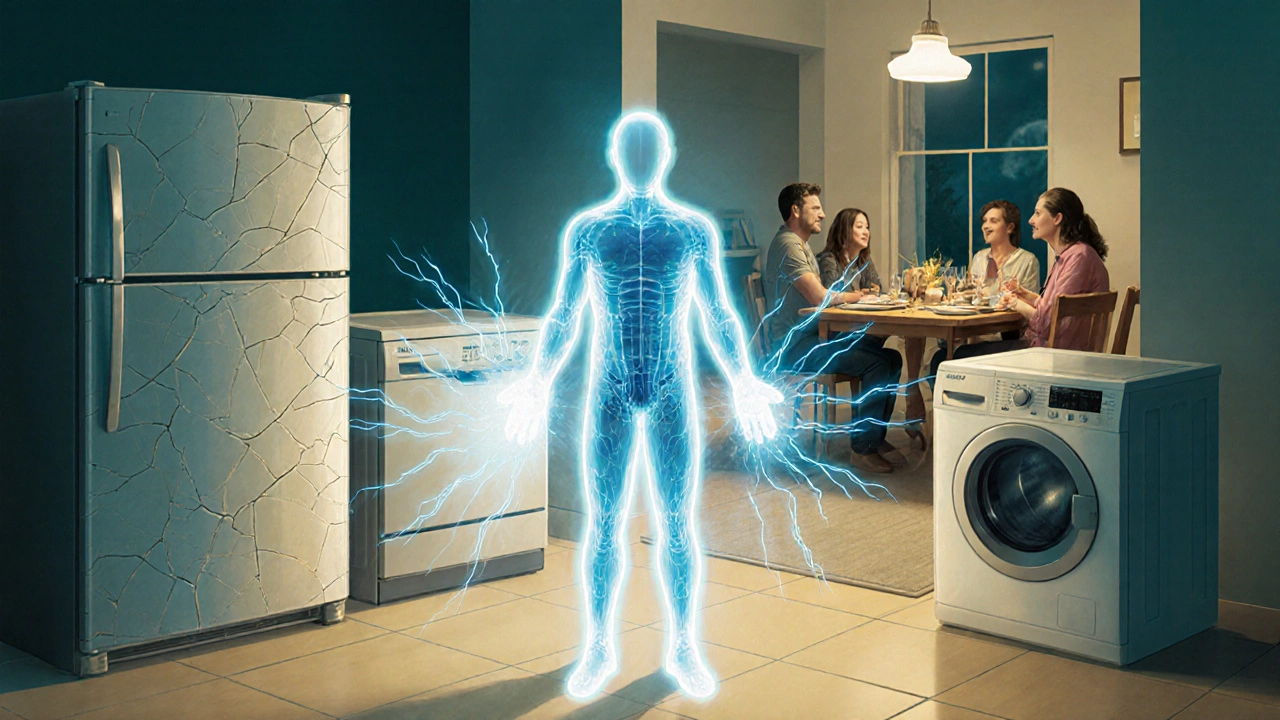
How to Find a Good One
Not everyone who says they fix appliances actually knows how. Look for these signs:
- They’re certified by a recognized body like the Appliance Industry Association (AIA) or hold a gas work license if needed.
- They carry liability insurance-this protects you if something goes wrong.
- They offer a warranty on parts and labor, usually 3-12 months.
- They don’t charge for a service call if you go ahead with the repair.
- They show you the old part and explain what failed.
A good specialist will never pressure you into a replacement. They’ll give you options. And they’ll answer your questions without jargon.
What Happens When You Skip Them?
DIY repairs might seem like a way to save money. But here’s what often happens:
- You break a sensor trying to access it.
- You install the wrong part and cause a bigger fault.
- You void the manufacturer’s warranty.
- You create a safety hazard-like a gas leak or electrical short.
- You end up paying twice: once for the failed fix, again for the real repair.
One Auckland homeowner tried to replace a washing machine pump themselves. They didn’t disconnect the power properly. The machine sparked, fried the control board, and damaged the water inlet valve. The repair bill jumped from $250 to $700. A specialist would’ve diagnosed it in 15 minutes and fixed it safely.
Is an appliance specialist the same as a handyman?
No. Handymen are great for general home fixes-hanging shelves, fixing leaky faucets, patching walls. But they usually don’t have the training or tools to safely diagnose and repair complex appliances. Appliance specialists focus only on household machines and have certifications in electrical, gas, and electronic systems. They know the exact error codes, wiring diagrams, and safety standards that handymen often don’t.
How long does an appliance repair usually take?
Most repairs take 1-2 hours if the part is on hand. Simple fixes like replacing a door seal or cleaning a drain pump can be done in 30 minutes. More complex issues-like replacing a control board or repairing a compressor-can take 2-4 hours. If the part needs to be ordered, it might take 1-3 days. A good specialist will give you a clear timeline upfront.
Can appliance specialists repair old or discontinued models?
Yes, many can. Even if a model is no longer sold, parts are often still available through distributors or third-party suppliers. Specialists have networks to source hard-to-find components. They’ve repaired 20-year-old fridges and 30-year-old stoves. The key is whether the part is still manufacturable or if a compatible substitute exists. If a repair isn’t feasible, they’ll tell you honestly.
Do I need to be home during the repair?
It’s best to be home, especially for the first visit. The specialist needs access to the appliance and may need to ask questions about how it was behaving. If you’re not home, they might not be able to test the repair properly. For follow-up visits or if you’re confident in their work, some offer lockbox or key drop options-but always confirm this in advance.
What’s the average cost of an appliance repair?
Service calls usually range from $80-$150, depending on location and time of day. Parts vary widely: a simple thermostat might cost $20, while a control board could be $200-$400. Labor is typically $70-$120 per hour. Most repairs cost between $150 and $400 total. If a quote is much higher, ask for a breakdown. Reputable specialists provide written estimates before starting work.
Final Thought: Your Appliances Are Worth Protecting
They’re not just machines. They’re part of your daily rhythm-the morning coffee brewed by the kettle, the clean clothes from the washer, the warm dinner cooked in the oven. When they break, your routine breaks with them. An appliance specialist doesn’t just fix a part. They restore your peace. They bring back reliability. And in a world where things are designed to be replaced, they’re the ones who still believe in fixing things right.
